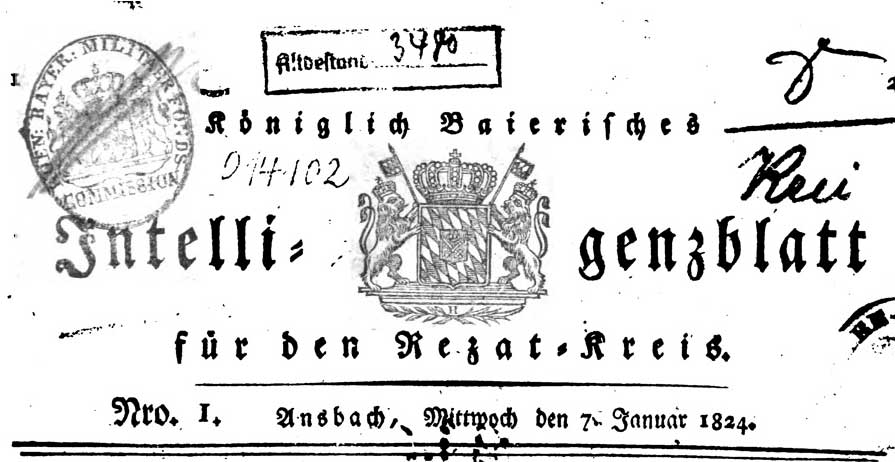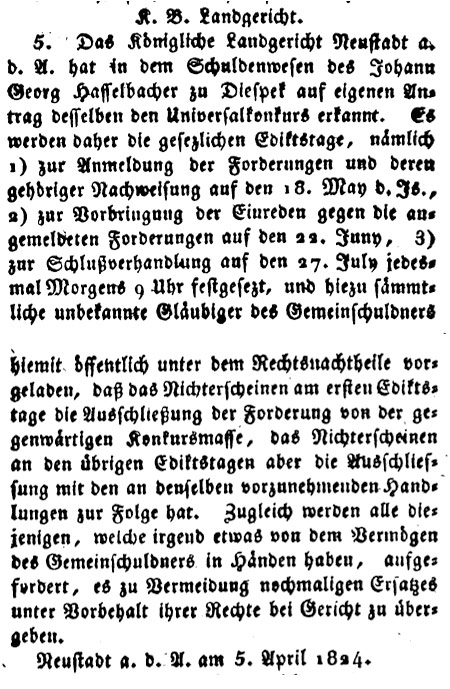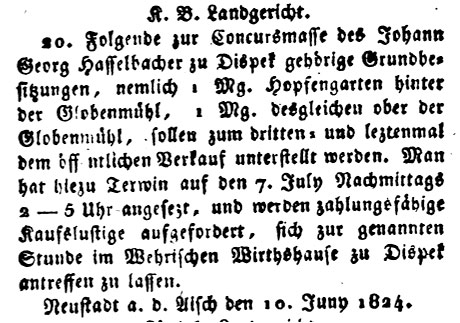God Bless Google Book-Search!
In the last month, I uncovered a number of items related to the old Hasselbachers by using Google Book search. I recently wrote about about a court report giving notice of the conviction of Andreas Friedrich Hasselbacher for assault with a weapon, and the acquittal of his father Georg for the same offense. This family is of particular interest as several of them come to America in the middle 19th Century.
In a different book that appears to record legal proceedings and notices, I found the following two items relating to to Johann Georg Hasselbacher, the father and grandfather of the two men above.
Johann Georg Hasselbacher (1766 - 1839) is an important person to me. He is my 5th GGrandfather and was the first Hasselbacher of my direct ancestors to be born in Diespeck. He is the last of my Hasselbachers who is called a farmer. He has 3 sons and at least one daughter. His oldest son drowns at the age of 22 while swimming alone in the Aisch River. His second oldest son, Georg, becomes a barrel-maker. His third and youngest son, Johann Konrad leaves Diespeck for Fürth, but returns later to Neustadt. Johann Georg's oldest child, Katharina Margaretha, remains unmarried and has a single child, my 3G Grandfather Johann Konrad who becomes a tailor, as does his son and grandson. I have posted an interactive family tree of Johann Georg's family and will continue to add links to original records.
It always seemed to me that the period surrounding the life of Johann Georg must have been an interesting one as his descendants branched out into different professions. I understood Katharina Margaretha to have been a dressmaker or tailoress, and I have assumed she had something to do with giving her son a profession other than farming. However, I held little hope of learning more: the church records alone had given what they could. That is why it is so exciting to be able to find some of these civil records.

Below is the first notice from the Royal District Court in Neustadt an der Aisch dated 5 April 1824. The first line or two tell me that Johann Georg has declared bankruptcy. I had difficulty with the remainder as it is archaic legalese whose words do not appear in modern dictionaries. It appears to be setting out dates and places for people to be able to register their claims in the matter.

It was immediately clear that the second notice of 10 June 1824 was the more interesting. I did the best I could and then asked my cousin in Germany to help me. He rose to the occasion again. Here is a transcription and translation.

#20. Folgende zur Koncursmasse des Johann
Georg Hasselbacher zu Dispek gehörige Grundbe=
sitzungen, nemlich (nämlich) 1 Mg. (Morgen) Hopfengarten hinter
der Globenmühl (Klobenmühle?), 1 Mg desgleichen ober der
Globenmühl, sollen zum dritten = und letzenmal
dem öffentlichen Verkauf unterstellt werden. Man
hat hie(r)zu Termin auf den 7. July Nachmittags
2 - 5 Uhr angese(t)zt, und werden zahlungsfähige
Kauf(s)lustige aufgefordert, sich zur genannten
Stunde im Wehrischen Wirthshause (Gasthaus Wehr) zu Dispek
antreffen zu lassen.
Item #20. Following, to the bankruptcy estate of John
Georg Hasselbacher Dispek corresponding basic
possessions, namely, 1 Mg (morning*) hops garden behind
the Globenmühl, 1 Mg likewise above the
Globenmühl should, for the third and the last time,
be subject of public sale. One
has set out the date on the 7th July afternoon
2 – 5 o'clock, and be able to pay shoppers are invited to the said
hour to come to Gasthaus Wehr at Dispek.
Discussion:
*My cousin did a great favor by explaining what the abbreviation "Mg." means. A Morgen or morning is an measure of an area of land! It's origin is said to be related to the amount of land one man and an ox could plow in a single morning! Even if incorrect, it is a nice story.
Here is the location of the Globenmühl in the early 1800s and the Klobenmühle today. Next trip to germany I will be sure to visit.
What have we learned? Johann Georg is having at least some of his property offered for sale as part of bankruptcy proceedings. This suggests to me that he owned the land! I have never understood to what extent these descendants of serfs and peasants would have been able to own their own land. We also learn that as a farmer he grew hops, a common crop in Diespeck. We learn that his two fields were behind and above the Globenmühl (mill). The designation of the Wehr Guesthause as the place of the sale is very interesting because the wife of Johann Georg was born Anna Maria Wehr. Her father Johann Heinrich Wehr was a farmer of Diespeck.
I am in the ream of speculation now, but this must have been a major event in the life of Johann Georg and his family. In 1824, Johann Georg was 58 years old. He died 15 years later. His surviving two sons at the time of the bankruptcy were 29 (Georg) and 22 (Johann Konrad). If Johann Georg lost all his land, farming may not have been available to him and his children. In 1824, Georg was already a barrel-maker. At the time of his wedding in 1845, youngest son Johann Konrad was a Bader, or barber. I know little of his history up to that time. Certainly if the family farm was struggling, there might have been additional pressure for the children to branch out into other trades. If the family fell further on hard times, it might also have predisposed them to emigrate to America. We have already had some inkling of further legal difficulties.
All of this has given me a yearning to look for additional civil records. I will also want to visit the Neustadt Archive again. Perhaps the original court records of the matter are available! All the more reason for me to redouble my efforts to learn German! Even such tiny details as above about what the lives of these early family were like provides a source of great satisfaction for me. I hope some of you will also catch the fever. Even with all the tremendous earlier work of others, there is more to be done than I can possibly do myself.